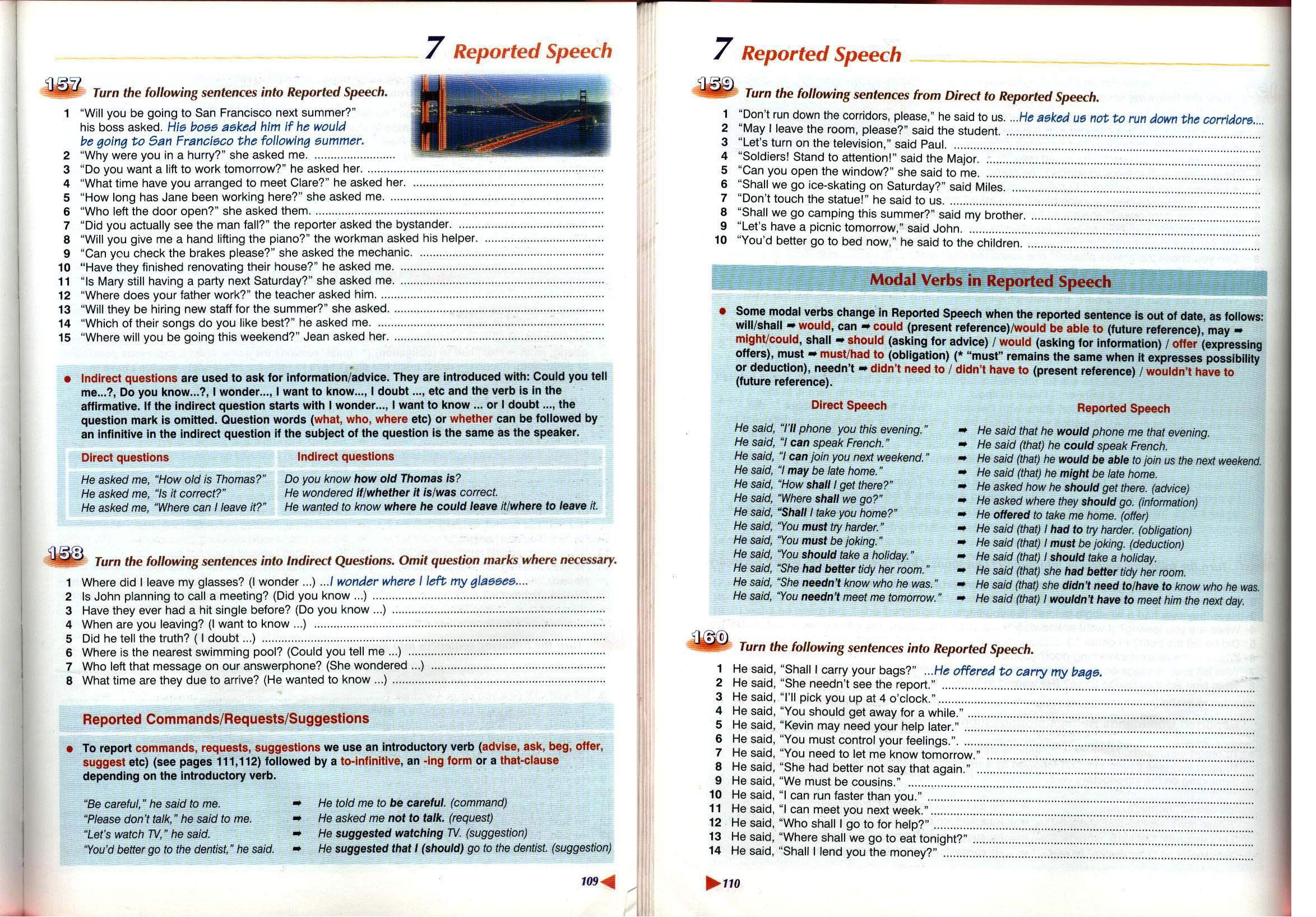Reported speech angiekski 3

7 Reported Speech

Tum the following sentences into Reported Speech.
1 “Will you be going to San Francisco next summer?" his boss asked. His boss asked him if he would be going to San Francisco the following summer.
2 “Why were you in a hurry?” she asked me..........................
3 “Do you want a lift to work tomorrow?” he asked her.............
4 “What time have you arranged to meet Clare?” he asked her.
5 “How long has Jane been working here?” she asked me......
6 “Who left the door open?” she asked them.............................
7 “Did you actually see the man fali?” the reporter asked the bystander.......
8 “Will you give me a hand lifting the piano?" the workman asked his helper.
9 “Can you check the brakes please?” she asked the mechanic...................
10 “Have they finished renovating their house?” he asked me.........................
11 “Is Mary still having a party next Saturday?” she asked me.........................
12 “Where does your father work?" the teacher asked him...............................
13 “Will they be hiring new Staff for the summer?” she asked...........................
14 “Which of their songs do you like best?” he asked me................................
15 “Where will you be going this weekend?” Jean asked her...........................
• Indirect questions are used to ask for information/advice. They are introduced with: Could you tell me...?, Do you know...?, I wonder..., I want to know..., I doubt..., etc and the verb is in the affirmative. If the indirect question starts with I wonder..., I want to know ... or I doubt.... the question mark is omitted. Óuestion words (what, who, where etc) or whether can be followed by an infinitive in the indirect question if the subject of the question is the same as the speaker.
Direct questions Indirect questions
He asked me, “How old is Thomas?" Do you know how old Thomas is?
He asked me, “Is it correct?” He wondered if/whether it is/was correct.
He asked me, "Where can I leave it?" He wanted to know where he could leave it/where to leave it.

Tum the following sentences into Indirect Questions. Omit question marks where necessary.
1 Where did I leave my glasses? (I wonder...).../ wonder where I left my glasses....
2 Is John planning to cali a meeting? (Did you know ...) ................................................
3 Have they ever had a hit single before? (Do you know ...) ..........................................
4 When are you leaving? (I want to know ...) ..................................................................
5 Did he tell the truth? (I doubt...) ..................................................................................
6 Where is the nearest swimming pool? (Could you tell me ...) .....................................
7 Who left that message on our answerphone? (She wondered ...) ..............................
8 What time are they due to arrive? (He wanted to know ...)..........................................
Reported Commands/Requests/Suggestions
• To report commands, requests, suggestions we use an introductory verb (advise, ask, beg, offer, suggest etc) (see pages 111,112) followed by a to-infinitive, an -ing form or a that-clause depending on the introductory verb.
“Be careful, ” he said to me.
“Please don't talk," he said to me. “Let’s watch TV," he said.
"You'd better go to the dentist," he said.
He told me to be careful. (command)
He asked me not to talk. (request)
He suggested watching TV. (suggestion)
He suggested that I (should) go to the dentist. (suggestion)
Reported Speech


Turn the following sentences from Direct to Reported Speech.
1 "Don’t run down the corridors, please,” he said to us. ...He asked us not to run down the corńdors....
2 “May I leave the room, please?” said the student................................................................................
3 “Let’s turn on the television,” said Paul................................................................................................
4 “Soldiers! Stand to attention!” said the Major......................................................................................
5 “Can you open the window?” she said to me......................................................................................
6 “Shall we go ice-skating on Saturday?” said Miles..............................................................................
7 “Don’t touch the statuę!” he said to us.................................................................................................
8 “Shall we go camping this summer?" said my brother........................................................................
9 “Let’s have a pienie tomorrow,” said John...........................................................................................
10 “You’d better go to bed now,” he said to the children.........................................................................
Modal Verbs in Reported Speech
• Some modal verbs change in Reported Speech when the reported sentence is out of datę, as follows: will/shall • would, can ■* could (present reference)/would be able to (futurę reference), may * might/could, shall » should (asking for advice) / would (asking for information) / offer (expressing offers), must -> must/had to (obligation) (* “must” remains the same when it expresses possibility or deduction), needn’t ■* didn't need to / didnt have to (present reference) / wouldn’t have to (futurę reference).
Direct Speech
He said, Tli phone you this evening." He
He said, “I can speak French." — He
He said, 7 can join you next weekend." ■* He
He said, “I may be tatę home." ■* He
He said, “How shall I get there?" + He
He said, “Where shall we go?" ~ He
He said, “Shall I take you home?” -» He
He said, “You must try harder. ” — He
He said, “You must be joking." ■* He
He said, “You should take a holiday. ” -» He
He said, “She had better tidy her room. ” ■* He
He said, “She needn’t know who he was." ■* He
He said, “You needn’t meet me tomorrow. ” ■» He
Reported Speech
said that he would phone me that evening.
said (that) he could speak French.
said (that) he would be able to join us the next weekend.
said (that) he might be tatę home.
asked how he should get there. (advice)
asked where they should go. (information)
offered to take me home. (offer)
said (that) I had to try harder. (obligation)
said (that) I must be joking. (deduction)
said (that) I should take a holiday.
said (that) she had better tidy her room.
said (that) she didn’t need to/have to know who he was.
said (that) I wouldn’t have to meet him the next day.
|
m |
Tl |
|
1 |
He |
|
2 |
He |
|
3 |
He |
|
4 |
He |
|
5 |
He |
|
6 |
He |
|
7 |
He |
|
8 |
He |
|
9 |
He |
|
10 |
He |
|
11 |
He |
|
12 |
He |
|
13 |
He |
|
14 |
He |
|
► 770 | |
said, “Shall I carry your bags?” ...He offered to carry my \?aqe.
said, “She needn’t see the report.” ..................................................
said, ‘Tli pick you up at 4 o’clock.”...................................................
said, “You should get away for a while.”..........................................
said, “Kevin may need your help later.”...........................................
said, “You must control your feelings.”............................................
said, “You need to let me know tomorrow.” ....................................
said, “She had better not say that again.” .......................................
said, “We must be cousins.” ............................................................
said, “I can run faster than you.” ......................................................
said, “I can meet you next week.”.....................................................
said, “Who shall I go to for help?”....................................................
said, “Where shall we go to eat tonight?” ........................................
said, “Shall I lend you the money?” .................................................
Wyszukiwarka
Podobne podstrony:
EWiP z j. angielskim rok 3,1°Reported Speech 1. Tura the following sentenccs into reported speech. 1
Tenses, Passiye Voice, Reported Speech, Conditionals, JModal Verbs, Going To,
The following indicators of insurance companies efficiency, can be characterized additionally, relat
Limitations of Online DDL Take the following considerations into account when creating or dropping I
76213 Suzuki RM125 6 17-16 REAR SUSPENSIONINSTALLATION • Reassemble the following
Task 3 3 Say the fact of the fołlowing sentences! 1. lfshe were herc, I would glye my phone numbtr.
44,45 Communication skills What function do the following sentences/phrases have? One example is giv
ANG2 k3 05 2 III. Yocabulary. Units 9& 10. T A) Complete the following sentences with appropriat
img501 Task 5 Read the following sentences and translate into English the phrases in the brackets. T
img012 (27) Grammar 1 The following sentences talk about procedures. Change them to the passive form
test 6 literatura brytyjska C. Dccidc whether the following sentences are TRUE or FALSE. If you fin
test 6 literatura brytyjska C. Dccidc whether the following sentences are TRUE or FALSE. If you fin
test 6 literatura brytyjska C. Dccidc whether the following sentences are TRUE or FALSE. If you fin
ANG2 k2 05 3 III. Stock Exchange terms. A) Complete the following sentences and answer the following
ANG2 k2 05 4 IV. The Environment. Just translate the following terms into (A) English, (B) Polish A)
Suzuki RM125 6 17-16 REAR SUSPENSIONINSTALLATION • Reassemble the following parts
więcej podobnych podstron